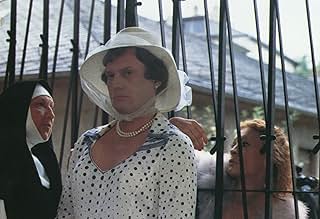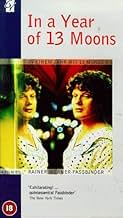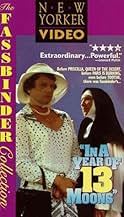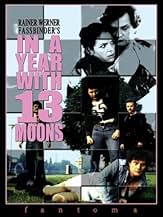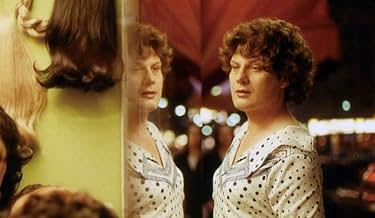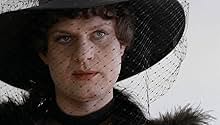NOTE IMDb
7,4/10
4,9 k
MA NOTE
Ajouter une intrigue dans votre langueA transgender woman tries to salvage something from the wreckage love has made of her life by confronting her anguished past, hoping to find ultimate acceptance among former acquaintances an... Tout lireA transgender woman tries to salvage something from the wreckage love has made of her life by confronting her anguished past, hoping to find ultimate acceptance among former acquaintances and herself.A transgender woman tries to salvage something from the wreckage love has made of her life by confronting her anguished past, hoping to find ultimate acceptance among former acquaintances and herself.
- Récompenses
- 1 victoire au total
Lilo Pempeit
- Schwester Gudrun
- (as Lieselotte Pempeit)
Janez Bermez
- Oskar Pleitgen
- (non crédité)
Rainer Werner Fassbinder
- Self
- (images d'archives)
- (non crédité)
Günther Holzapfel
- Angestellter H. H. Brei
- (non crédité)
Ursula Lillig
- Putzfrau
- (non crédité)
Augusto Pinochet
- Self
- (images d'archives)
- (non crédité)
Histoire
Le saviez-vous
- AnecdotesThe tape-recorded narration heard throughout the film (particularly during the final scene) was not scripted. Volker Spengler (playing Elvira Weishaupt) and Rainer Werner Fassbinder recorded the narration together, with Fassbinder asking questions and Spengler responding in character. In the final cut of the film, Fassbinder's voice is edited out.
- Bandes originalesSchöner fremder Mann
Music and Words by Athena Hosey and Hal Gordon and German lyrics by Camillo Felgen
Performed by Connie Francis
Commentaire à la une
First of all, I would not call this a trans-or LGBT-themed film. Elvira, the main character, may have had trans surgery, but the plot makes it clear that they aren't a trans woman, that they made a mistake having the surgery. But it's also clear that the main character isn't a man, either-they are a person with a lack of identity. So it's a mistake to classify this one with the stories of trans men and women, it's about something very different.
Elvira's lack of identity surfaces in the fact that they can't remember their childhood at all, and when they search for details on it, the results are even more frustratingly ambiguous. They think that loving someone else gives them an identity, and it is this part of falling in love that they love the most-not so much being with another human being, but what it turns them into. That's why they undergo the surgery-because they think it will make them something when they are starting out as nothing. The surgery is just another turn of the screw for them-just another way of groping for an identity that isn't there. It's a much bleaker and more existential story than any trans-themed film I've ever seen.
The film leaves us with more questions than answers, which is how it should be. The characters speak in long monologues that raise lots of questions but no answers. They're more riddles than statements, and it's maddening. Maddening because the more Elvira searches for answers, the more they slip away from them. It's like a horrible taunt for Elvira, and we, in the audience, are not spared one moment of the terrible ambiguity of it all. Fassbinder's compositions add to the confusion, showing us a world that is as unclear to us as it is to Elvira.
For anyone going into this film looking for an LGBT story, you will be disappointed, as you will be if you like a story with a solid resolution. But for those who tolerate ambiguity and frustration-and, indeed, see how they can be virtues in art-you may well be dazzled and hypnotized.
Elvira's lack of identity surfaces in the fact that they can't remember their childhood at all, and when they search for details on it, the results are even more frustratingly ambiguous. They think that loving someone else gives them an identity, and it is this part of falling in love that they love the most-not so much being with another human being, but what it turns them into. That's why they undergo the surgery-because they think it will make them something when they are starting out as nothing. The surgery is just another turn of the screw for them-just another way of groping for an identity that isn't there. It's a much bleaker and more existential story than any trans-themed film I've ever seen.
The film leaves us with more questions than answers, which is how it should be. The characters speak in long monologues that raise lots of questions but no answers. They're more riddles than statements, and it's maddening. Maddening because the more Elvira searches for answers, the more they slip away from them. It's like a horrible taunt for Elvira, and we, in the audience, are not spared one moment of the terrible ambiguity of it all. Fassbinder's compositions add to the confusion, showing us a world that is as unclear to us as it is to Elvira.
For anyone going into this film looking for an LGBT story, you will be disappointed, as you will be if you like a story with a solid resolution. But for those who tolerate ambiguity and frustration-and, indeed, see how they can be virtues in art-you may well be dazzled and hypnotized.
- elisereid-29666
- 24 avr. 2020
- Permalien
Meilleurs choix
Connectez-vous pour évaluer et suivre la liste de favoris afin de recevoir des recommandations personnalisées
- How long is In a Year with 13 Moons?Alimenté par Alexa
Détails
- Date de sortie
- Pays d’origine
- Langue
- Aussi connu sous le nom de
- In a Year with 13 Moons
- Lieux de tournage
- Sociétés de production
- Voir plus de crédits d'entreprise sur IMDbPro
Box-office
- Budget
- 700 000 DEM (estimé)
- Durée2 heures 4 minutes
- Mixage
- Rapport de forme
- 1.66 : 1
Contribuer à cette page
Suggérer une modification ou ajouter du contenu manquant

Lacune principale
By what name was L'année des treize lunes (1978) officially released in India in English?
Répondre
